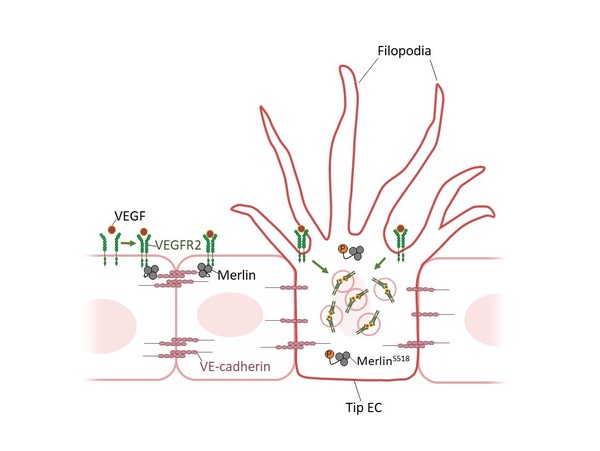The Institute of Basic Science (IBS) said Monday that its researchers have revealed that Merlin, a protein in vascular cells, is a key material that makes a restraining adjustment of angiogenesis through animal experiments.

Angiogenesis is a process whereby new blood vessels grow from existing mature blood vessels and promote fetus growth and wound healing. However, if excessive or insufficient angiogenesis occurs, damaged blood vessels develop, leading to cancer, macular degeneration, ischemic heart disease, and vascular dementia.
Accordingly, research on regulatory factors that promote or suppress angiogenesis and developing disease treatments is actively underway.
The vascular endothelial growth factor (VEGF) receptor binds to VEGF secreted around the blood vessel and activates the vascular tip cell to promote angiogenesis. Through VEGF stimulation, certain cells differentiate into tip cells, forming Filopodia, while advanced peripheral cells differentiate into Stalk cells, making the lumen of blood vessels. VE-Cadherin, a cell-cell adhesion protein, stabilizes vascular endothelial cells, and angiogenesis differentiation is completed.
In vascular endothelial cells with high VE-Cadherin density, Merlin, VEGF receptors, and VE-Cadherin bind to each other to inhibit intracellular movement of VEGF receptors.
When researchers selectively removed Merlin from the tumor vessel, advanced cells increased, and large cells decreased. Consequently, tumor blood vessels were transformed into abnormal blood vessels, and tumor growth was reduced due to decreased oxygen in the blood.
"We confirmed that Merlin binds to VEGF receptors to inhibit angiogenesis and now need to determine how Merlin interacts with angiogenesis promoting substances," said Bae Jeong-hyun, a postdoctoral associate at IBS.
Ko Kyu-young, chief of the blood vessel research group, also said. "The homeostasis of angiogenesis is maintained through the interaction of angiogenesis activating substances and controls such as Merlin, but if this balance is disturbed, it can lead to many vascular diseases."
Ko added that the team expects this study to open up the possibility of developing new drugs targeting Merlin for diseases such as cancer, macular degeneration, and other vascular diseases whose pathogenesis has not yet been identified.
The results of this study were published in the international journal, Science Advances.

